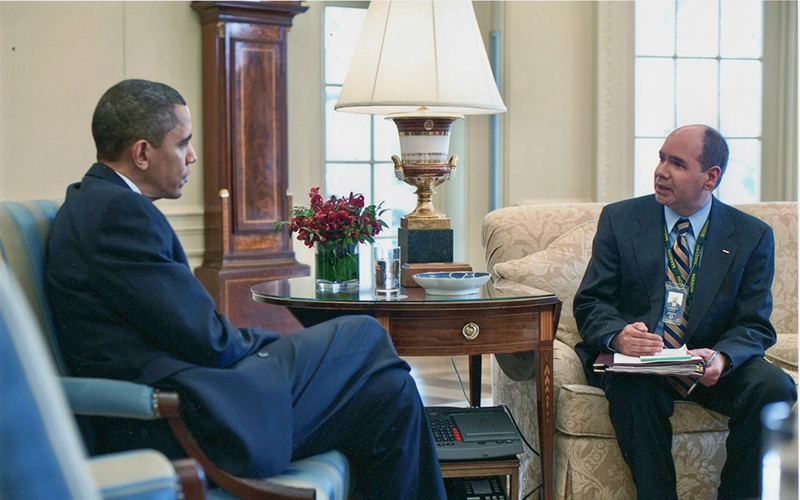

When it comes to supporting senior-level decision makers with intelligence, Schar School of Policy and Government adjunct professor and Mason alum James P. Danoy has been there and done that.
For more than a year, Danoy served as the daily intelligence briefer to President Barack Obama. Wherever in the world the president was at the time, Danoy met with him each morning to present the President’s Daily Brief—the PDB—the Intelligence Community’s daily assessment on national security issues produced for the president. That included sitting in the Oval Office, flying aboard Air Force One, and hanging out at Camp David.
As a Defense Intelligence Agency officer, Danoy was the first non-CIA officer to serve as a presidential briefer—and he no doubt is the only George Mason University graduate to serve in the role. Recently, Danoy found his service as the PDB briefer enshrined in the Defense Intelligence Agency Museum at the agency’s headquarters in Washington, D.C.
Danoy, who teaches intelligence policy in the Schar School’s international security program, has two degrees from Mason that he says prepared him for what’s been called “the most important job in the Intelligence Community”: He received a bachelor’s degree in government and international politics in 1979 and a master’s degree in modern European history 11 years later.
“My degrees at Mason were a great foundation for what I was later going to do, which is serve as an intelligence officer,” he said. “They really gave me a solid foundation to be an intelligence analyst specializing in Europe, but also an understanding of how the government operates and what the role of the Intelligence Community was in supporting decision-making.”
On occasion, he said, he made sure to wear a Mason necktie and badge lanyard “because I’m a proud Mason graduate.” Obama, he said, took notice when he wore the green and gold; he was fond of the university. While in office, both Obama and former First Lady Michelle Obama paid visits to Mason.
For his part, Obama respected the Intelligence Community’s straight-forward, unvarnished briefings that not only provided information but also context.
“He knew it wasn’t always going to be good news,” Danoy said, “but he said it was very important for him to know what was going on so he could make the right decisions.”
The tour of a presidential briefer, he said, is, well, brief.
“I did it a little more than a year, in 2010 and 2011. It’s a pretty taxing position, both mentally and physically,” he said. “You have to essentially be with the president pretty much all the time, domestically and overseas. They found that about a year or so of doing that is about as much as any individual can take.”
Danoy’s “day” as a briefer started at midnight at CIA headquarters in Langley, where he would study new information and prepare the material for the next morning’s presentation at the White House, if POTUS is not traveling. The briefer must know the new information as well as the history of the situation extraordinarily well, Danoy said. “It was like cramming for finals every day.”
The daily briefing was scheduled for 30 minutes, with the material organized with the most “need-to-know” information first, since the president’s schedule—structured in five-minute increments—was likely to change. Danoy was still studying the night’s work as he was driven down the George Washington Memorial Parkway to the Eisenhower Executive Office Building, where the Director of National Intelligence was waiting for an update. Then it was to the West Wing for a “pre-brief” with the national security advisor and others.
Finally, “at about 9:30 we’d be ushered into the Oval Office,” he said. The door opens and there’s the president, in a chair near the sofa where he’s most likely spent the morning with foreign dignitaries and other visitors.
Meeting POTUS at first, he said, “it’s one of those, ‘wow, I can’t believe it moments.’” But the briefer can’t afford to be starstruck for long: “You have to remain composed; you have to be calm and professional and crisp and clear and concise. You have to make eye contact, you can’t read off a piece of paper,” Danoy said. “You have to assess in a split second his mood. You have to know what’s on his schedule for that day” because it could influence his decision-making.”
To use a baseball metaphor, the briefer “certainly can’t strike out” on any given morning, he said. “Even hitting a single or a double is not good enough. You’ve got to hit a home run every time you’re there.” Overall, Danoy said “it was an incredible honor” to have represented the hard-working women and men of the Intelligence Community and “an experience of a lifetime.”
